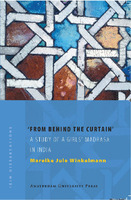From Behind the Curtain
A Study of a Girls' Madrasa in India
Abstract
In the aftermath of 9/11 Islamic seminaries or madrasas received much media attention in India, mostly owing to the alleged link between madrasa education and forms of violence. Yet, while ample information on madrasas for boys is available, similar institutions of Islamic learning for girls have for the greater part escaped public attention so far. This study investigates how madrasas for girls emerged in India, how they differ from madrasas for boys, and how female students come to interpret Islam through the teachings they receive in these schools. Observations suggest that, next to the official curriculum, the 'informal' curriculum plays an equally important role. It serves the madrasa's broader aim of bringing about a complete reform of the students' morality and to determine their actions accordingly. Gedurende de nasleep van 11 september 2001 kregen de islamitische hogescholen, oftewel de madrasas, veel aandacht in de Indiase media. Dit kwam voornamelijk door de veronderstelde schakel tussen madrasa onderwijs en vormen van geweld. Terwijl veel bekend is over madrasas voor jongens bleven soortgelijke onderwijsinstellingen voor jonge vrouwen tot dusver betrekkelijk onttrokken aan de publieke aandacht. Dit onderzoek belicht de vraag hoe islamitische scholen voor jonge moslim vrouwen tot stand zijn gekomen in India, hoe zij zich onderscheiden van madrasas voor jongens, en hoe de jonge vrouwen islam interpreteren n.a.v. wat hen bijgebracht wordt. Observaties geven aan dat naast het officiële curriculum het informele curriculum een even belangrijke rol speelt. Het draagt bij aan het grotere doel van de madrasa, namelijk de hervorming van de moraliteit van de studenten en het bepalen van hun handelingen in lijn daarmee.
Keywords
fundamentalism; women; religie; religious education; anthropologie; india, delhi; women's education; gender; islamism; religion; education; piety movements; anthropology; madrasa; tabligh jamaatDOI
10.5117/9789053569078ISBN
9789053569078OCN
1166374360Publisher
Amsterdam University PressPublisher website
https://www.aup.nl/Publication date and place
2005Series
ISIM Dissertations,Classification
Religion and beliefs
Islam
Sociology and anthropology


 Download
Download